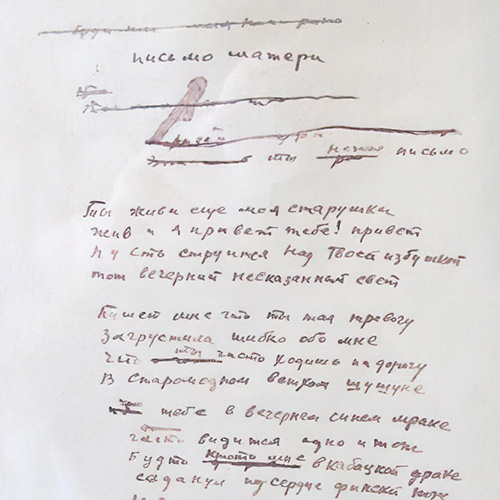
Are you alive and well still, momma?
I am alright. Greetings. Tonight
I hope your cottage is still bathing
In that ineffable evening light.
I've heard you're awful worried for me,
That you've been hiding your distress,
And often walk out on the highway
In your old-fashioned peasant dress,
And often see the same recurring
Dream, as the evening shadows start,
Of some punk in a bloody bar-fight
Sticking a switchblade* through my heart.
Don't worry, ma. It is just nasty
Imagination. Even I
Am not a diehard enough drunkard
To not see you before I die.
I'm still your son, love you as always
And all I dream of is to come
Back in one piece from gnarly anguish
And look again on our old home.
I'll come back as the spreading blossom
Of spring makes our white garden grow.
But please don't wake me at first morning
Light, like you did eight years ago.
Don't stir up dreams forever done with.
Don't fret about what never was.
I learned too early in my life to
Stick it out through exhausting loss.
And don't teach me to pray. Why bother?
The old days are long gone in night.
You're my one joy and comfort, mother.
You are my one ineffable light.
So best forget that awful worry,
Don't sink yourself in such distress.
Don't walk so much out on the highway
In that old-fashioned peasant dress.
* - the original here says "Finnish knife." So named because it was developed from the puuko, a bodkin used by Finnish woodsmen, the Russian "Finnish knife" or finka was extensively modified to make it useful for fighting: with a long blade, a clip-point back, and a large handguard. This made it convenient for amateur assassination, as its design meant that even those who couldn't handle a knife very well could stab somebody and not accidentally cut themselves. It became a "gangster's blade" so strongly associated with the criminal underworld that it was banned in the Soviet Union in the 30s. The NR-40 combat knife used by the Soviet Army during WWII is a mass-produced version of this infamous gang weapon.
Ты жива еще, моя старушка?
Жив и я. Привет тебе, привет!
Пусть струится над твоей избушкой
Тот вечерний несказанный свет.
Пишут мне, что ты, тая тревогу,
Загрустила шибко обо мне,
Что ты часто ходишь на дорогу
В старомодном ветхом шушуне.
И тебе в вечернем синем мраке
Часто видится одно и то ж:
Будто кто-то мне в кабацкой драке
Саданул под сердце финский нож.
Ничего, родная! Успокойся.
Это только тягостная бредь.
Не такой уж горький я пропойца,
Чтоб, тебя не видя, умереть.
Я по-прежнему такой же нежный
И мечтаю только лишь о том,
Чтоб скорее от тоски мятежной
Воротиться в низенький наш дом.
Я вернусь, когда раскинет ветви
По-весеннему наш белый сад.
Только ты меня уж на рассвете
Не буди, как восемь лет назад.
Не буди того, что отмечталось,
Не волнуй того, что не сбылось, —
Слишком раннюю утрату и усталость
Испытать мне в жизни привелось.
И молиться не учи меня. Не надо!
К старому возврата больше нет.
Ты одна мне помощь и отрада,
Ты одна мне несказанный свет.
Так забудь же про свою тревогу,
Не грусти так шибко обо мне.
Не ходи так часто на дорогу
В старомодном ветхом шушуне.